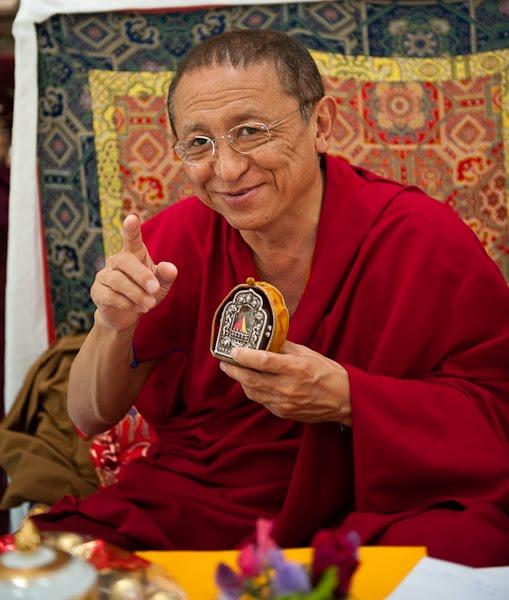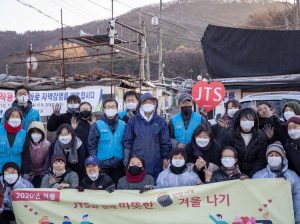
At the age of 63, the Tibetan Vajrayana master Chökyi Nyima Rinpoche travels the globe sharing the timeless teachings of the Buddha. When at his home monastery in Kathmandu, he tirelessly gives instruction in the Dharma to seekers from both Nepal and elsewhere. Hundreds attend his famous Saturday morning talks, where Rinpoche delivers the most profound teachings in an effortless manner, delighting the audience with his laughter and good cheer. Moreover, in November each year he offers a ten-day seminar on the theories and practices of Tibetan Buddhism to a mostly Western audience. Anybody attending any of these programs will see a real bodhisattva—in real time.
Each day when his schedule allows, Rinpoche also meets visitors in his office-residence on the third floor of his monastery. The visitors could be high lamas, lay followers, students of Buddhism, housewives, people with problems . . . Nobody leaves “empty-handed.” Rinpoche’s overflowing compassion is more than enough for everyone, and they return home with the hope, solace, and blessings they seek.
A disciple of the 16th Gyalwang Karmapa, the great Nyingma master Kyabje Dilgo Khyentse Rinpoche, and his own father Kyabje Tulku Urgyen Rinpoche, Chökyi Nyima Rinpoche is considered one of the greatest masters of Dzogchen alive today. In 1976, at the young age of 25, he became the abbot of his monastery, Ka-Nying Shedrub Ling. Popularly known as the Seto Gumba (White Monastery), the complex lies just behind the great Boudhanath Stupa in Kathmandu and was built by his family on the Karmapa’s instruction. Rinpoche’s father, Tulku Urgyen Rinpoche, had taken the family to safety in Sikkim just before the Chinese invasion of Tibet, and they later moved to Nepal.
This writer caught the assiduous master at one of his “at homes”—and was gifted with his words of wisdom. I asked Rinpoche to tell some stories about his masters. With a compelling smile and impeccable grace, Rinpoche’s response was: “Let’s not go with the history, but with the teachings.”
“My masters taught me not to think in terms of ‘I’ and ‘mine.’ They taught me to think about others—how we could help others overcome their suffering. Everybody is suffering. Only wisdom can protect and liberate them from suffering—that is what I learned from my masters,” he said. Evidently, compassion for humanity is Rinpoche’s guiding force. His relentless schedule and altruism are testimony to the fact that he fully lives his masters’ teachings.
On being asked how we should go about solving the social problems of today, Rinpoche replied: “The Buddha taught us the way to happiness 2,500 years ago. But we tend to forget it. In Nepal, we take pride in saying this is the country of Mount Everest and the Buddha, but see how we have forgotten him, and where we are now.
“The Buddha taught us basically three things—sila [moral conduct], samadhi [meditative absorption], prajna [wisdom]. Forget prajna, which is deeper that the ocean. One life is not enough to learn it all. Forget also samadhi. Just take sila—don’t think sila is only to be observed by monks and nuns. No! These are the Five Precepts* that bring happiness, and that all should follow.
“Why does society suffer? Why are there all the problems? Do you think there would be people in jail if everybody followed the Five Precepts?” asked Rinpoche.
“We all need peace in the world. Just by calling the name of a god, can you help the world? You think just reciting the name of God, or Allah, or Buddha, or Shiva, will help you? We need to think logically. What is logic? You see, the teaching of sila is very logical. It is the law of nature.
“Is there a fire that does not burn? If one acts out of greed, hatred, and delusion, then there will be suffering—not only for you alone, but for others also. When you know this, will you do anything wrong?
“See how the problems in our society arise. Why do we need the army and the police? The police carry the stick. Is it for the dogs? Or for the donkeys? Or for the tigers? Is it for the elephants? No! It is for the people! They don’t use the stick on people for their own pleasure. They have to use the stick because the people have broken one of the Five Precepts!
“We see violence, robbery, sexual misconduct, theft, and things like that. Why do these things happen? Because we have forgotten the Five Precepts. This makes us unhappy. When we tell lies, there will be problems. People take intoxicants. The Buddha taught us the Five Precepts. Had we followed them, would we have any problems?”
Rinpoche is especially concerned about today’s youth: “See what our youths are up to these days? Not only are they taking alcohol, they are also taking drugs. They are killing people and themselves. It is not the problem of the youth alone, but it is the problem of their seniors as well. It is the problem of the whole family, society, country, and the world. If one young man takes drugs, it is the shame on the government itself!”
Be serious about youth issues, was Rinpoche’s message to the leaders. “We need to teach the moral principles right from the school. We need experts in school for this. It is the duty of us all. We should discuss it.”
Like most other high-ranking Tibetan Buddhist teachers, Rinpoche is believed to be a reincarnation of a past master. At the age of 18 months, he was recognized as the seventh incarnation of the Drikung Kagyu lama, Gar Drubchen, a Tibetan mahasiddha (“great adept”) and spiritual emanation of the well-known 2nd-century Indian Buddhist philosopher, Nagarjuna.
I asked whether Rinpoche remembered anything about his past life. “When I was a young child of about two or three, I could remember things of the past very clearly,” he replied. “But that is not important. As you grow, the memory fades. Let’s not go with the stories, but with the teachings. That is important.”
*The Five Precepts comprise the five basic disciplines of moral conduct: not harming living beings, not taking what is not freely given, not engaging in sexual misconduct, truthfulness, and avoiding intoxicants.
Based in Kathmandu, Kalyaanmitra Arun is a student of Buddhism and is fascinated by the bodhisattva ideal.






